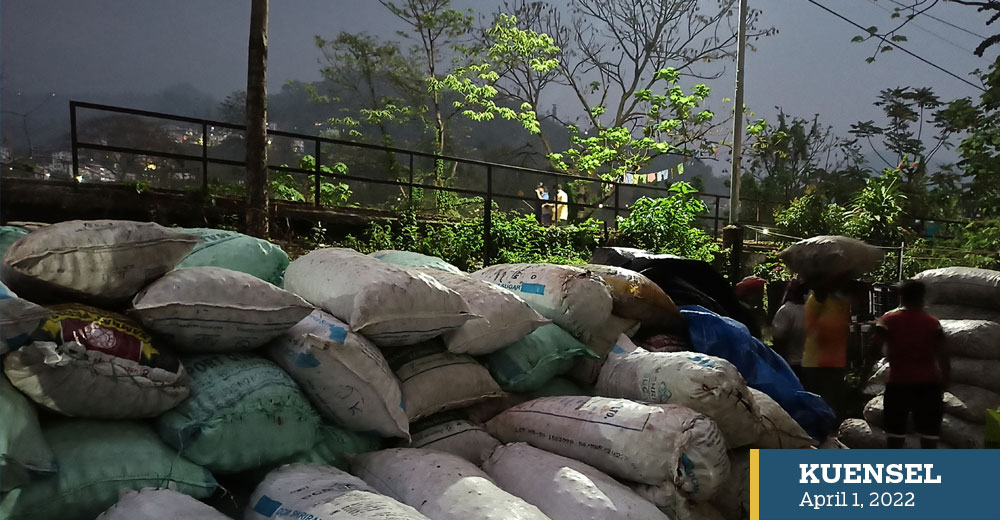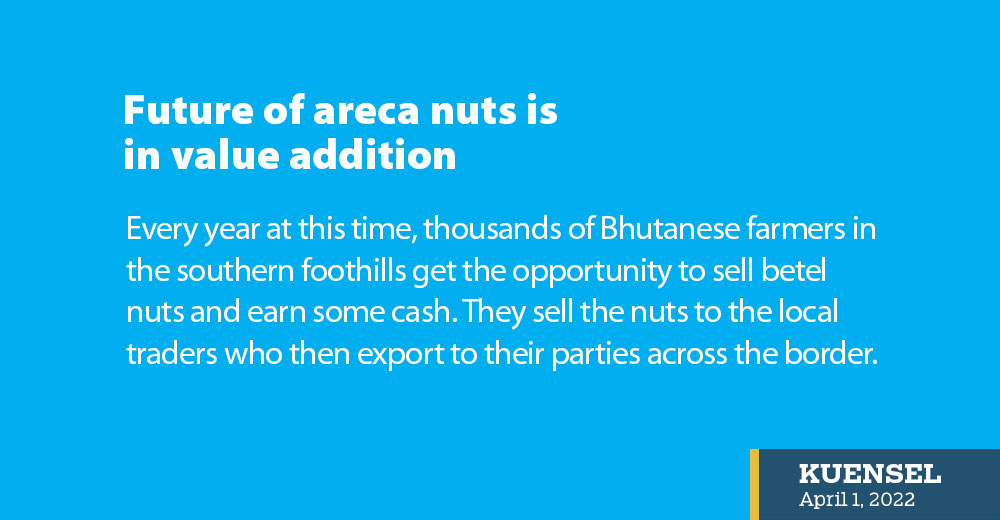Rajesh Rai | Phuentsholing
Every year at this time, thousands of Bhutanese farmers in the southern foothills get the opportunity to sell betel nuts and earn some cash. They sell the nuts to the local traders who then export to their parties across the border.
However, both traders and farmers, including the importers across the border, are facing difficulties exporting the nuts.
This is the second year such a problem has emerged. Betel nut exporters in Phuentsholing are once again at crossroads as they are unable to export from Jaigaon.
According to the exporters, the counterpart officials across the border have informed that the price of the betel nut should be Nu 251 per kg. This means even if they don’t import at this rate, the officials will levy tax on the same value as prescribed.
An exporter, Singey Wangdi, said that the areca nuts for Nu 251 per kg that the officials are seeking are not the ones they export, the green ones.
“What they are talking is supari—derivative of the nut,” he said.
The exporters themselves pay Nu 38 to Nu 40 per kg for the green doma to farmers, Singey Wangdi said, explaining the same is exported with a few ngultrums per kg as profit.
He said it was not possible to sell the same at Nu 251 per kg.
“But yes, if there were importers who can pay Nu 251 per kg, we will readily pay the taxes. We will be happily pay our taxes for the same.”
The exporter said that villagers keep calling them for payment. It is ultimately the farmers who will suffer if exporters stop buying from them, he added.

A consignment waiting for export in Phuentsholing
“We cannot keep on asking the villagers to wait for the payment. We have to pay them.”
Exporters are worried because the same problem arises every year. They pointed out that unless the government takes up the matter with the Indian Government or the West Bengal government, the problem will remain.
One betel nut trader and a grower, Som Bahadur, said the problem will continue if not solved between the two governments.
“Starting from Daifam to Sipsoo, there are farmers who are into growing betel nuts. They will suffer,” he said.
“And farmers cannot raise the issues with the government.”
Many say that if betel nuts cannot be exported, it must be value-added for export or for self-consumption. Bhutan can actually adequately value-add and produce fermented doma (moza), supari, and even make manure from husk.
However, most paan shops prefer Indian mozas because they are bigger compared to the Bhutanese mozas. Sources say that the Indian mozas add chemicals for preservation whereas Bhutanese are organic and healthy.
One of the co-founders of Druk Dramzang Doma (DDD), a business establishment that deals with betel nut value addition in Samtse, Parshu Ram Sharma, said Bhutan has a round the clock market for doma.
“But the market is flooded with imported domas,” he said. “Bhutanese trust imported more than ours because of the size.”
Parshu Ram Sharma said that a pon (80 pieces) of imported peeled doma costs about Nu 500 to Nu 540. DDD today offers a retail price of Nu 440 and wholesale price of Nu 410 to Nu 420.
“We still have half of what we purchased from farmers in 2021,” Parshu Ram Sharma said, explaining that DDD bought over 40 to 50 percent of betel nuts from Samtse farmers last year when the export was brought to abrupt halt.
“Farmers have started to call now. But we are yet to sell off what we processed from last year.”
Parshu Ram Sharma said DDD’s plan is to have Bhutanese to consume homegrown doma and substitute import. DDD is also currently exploring business to buy green betel nuts from farmers. DDD will add value and export.
In 2020, Bhutan, according to Bhutan Trade Statistics (BTS), imported 3.08 metric tonnes (MT) of areca nuts worth Nu 308,776. Bhutan also imported 76.89MT of betel nuts (in shell) worth Nu 9.77 millions (M) and 205.16MT of shelled betel nuts worth Nu 34.21M.
However, considering that areca nut and betel leaves import in Bhutan has been associated with corruption, according to the Anti-Corruption Commission (ACC) investigations in 2021, this import figures could go higher as those who were involved undervalued the import. On December 14, 2021, the police and ACC officials intercepted four vehicles carrying areca nuts and betel leaves consignments that were under-declared but were cleared from the Mini Dry Port (MDP) in Phuentsholing.
Meanwhile, the economic affairs minister, Loknath Sharma said people prefer to sell areca nuts when they are still green instead of mature because they do not prefer to undertake value addition.
“Our growers prefer exporting early while green because the risk of betel nuts falling off the tree is more during the monsoon as load on trees increases,” he said.
On the existing export problem, exporters are seeing a relief as they are exporting from Gelephu. However, they say that this is a temporary measure and needs a permanent solution to help farmers.
Lyonpo Loknath Sharma said that the government has been in touch with the Indian Government on the issue.
“Discussion with India is underway and a favourable outcome is anticipated by April on such barriers,” he said. “We will also take this up with the state government of Assam and West Bengal.”


